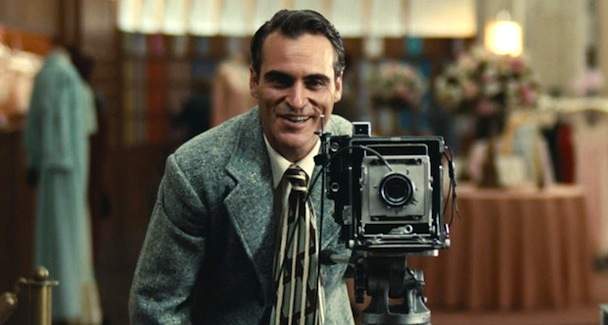The Master
Visually stunning and superbly acted, Paul Thomas Anderson's latest film ultimately feels a touch pointless.
Overview
Paul Thomas Anderson's latest film The Master opens with an exquisite shot of swirling white and indigo — the surging, seething wake of an enormous ship at sea. It is a striking visual and one of two leitmotifs periodically revisited by the director throughout his 138-minute study of a Scientology-styled movement and its charismatic leader, Lancaster Dodd (Philip Seymour Hoffman).
Thematically, the image of the swirling wash neatly reflects the social and political tumult of post-war America in the '40s, as well as offering an elegant précis of Anderson's central character, Freddie Quell (Joaquin Phoenix), an unsettled veteran and alcoholic outcast rendered psychologically 'lost at sea' following his discharge from the navy. Yet for audiences, too, the visual speak emblematically to The Master's principal shortcoming. It is a truly stunning film, but one that ultimately proves a whirling and directionless clutter of themes from which little substance can be extracted.
To its strengths, though, The Master is first and foremost a character study of its two leading men, and the performances by Phoenix and Hoffman are almost unreasonably good. Both actors offer phenomenal characterisations layered with extraordinary complexity and penetration, making their constantly shared screen time an unceasing dilemma over whom to watch. Thankfully, Anderson spares us this conflict, often enough courtesy of some extreme individual close-ups, using Hoffman's ruddy complexion and Phoenix's contorted snarl as baseline emotional canvases from which both men launch their subtle yet fervent transformations.
Prior to its release, rumours of The Master's allusions to Scientology via Dodd's quasi-spiritual movement 'The Cause' earned it enormous press, both good and bad, and certainly the equivalence between the two is strong. Dodd's 'processing' of individuals borrows heavily from the teachings and practices of Scientology's founder, L. Ron Hubbard, and provides perhaps the film's most compelling scene; however, Anderson never explores this or any other theme to its complete end.
After a near flawless opening act, The Master begins to stumble incoherently from one beat to the next as if searching for some greater meaning in precisely the same way its characters do. It is a delight to watch and the performances are utterly enthralling; however, Anderson's distinction as a director is sadly not matched by his story. Ponderous and indulgent, the eventual impression is one of incompleteness and abstraction — just a swirling, seething wake of brilliant white and indigo.





